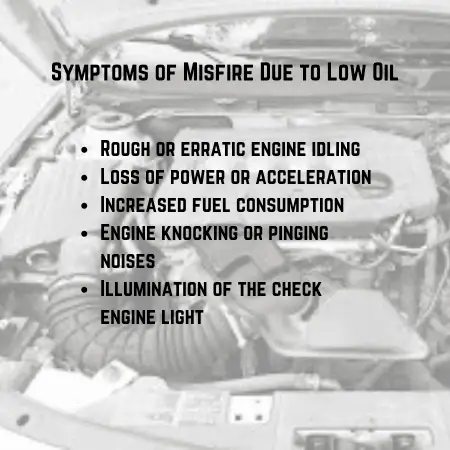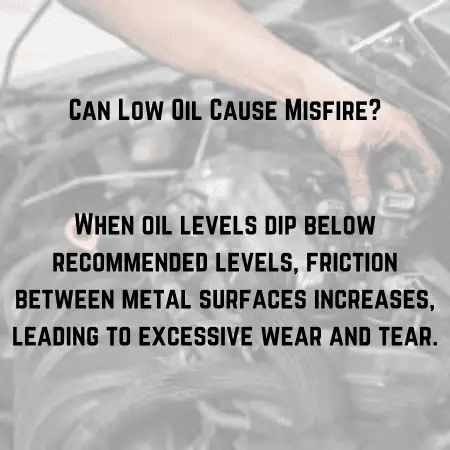You are driving the car when suddenly, your car starts to shudder and jerk. Your heart skips a beat as you realize something might be wrong with the engine. You feel nervous and start to find out what can be wrong. One common issue that can lead to this unsettling experience is an engine misfire. In this article, we will try to find out Can Low Oil Cause Misfire? So keep on reading to find the answer.
Can Low Oil Cause Misfire? The short answer is yes, low oil levels can indeed contribute to engine misfires. When oil levels drop below the recommended level, several problems can arise. Firstly, insufficient lubrication can cause increased friction between moving parts, leading to overheating and potential damage. Low oil levels can result in poor oil circulation, affecting the performance of vital engine components such as pistons and valves. This can ultimately disrupt the combustion process, resulting in misfires.
What is Engine Misfire?
An engine misfire occurs when one or more cylinders in an engine fail to ignite properly. This can result in a variety of symptoms, from a slight vibration to a noticeable loss of power. Causes of misfires can range from faulty spark plugs to fuel delivery issues.

Role of Oil in Engine Functioning
Oil plays a crucial role in keeping a car’s engine running smoothly. It acts as a lubricant, which means it reduces friction between moving parts in the engine. Without enough oil, these parts would rub against each other and wear out quickly, leading to damage and potentially even engine failure.
1- Oil helps to cool down the engine by carrying heat away from the combustion chamber. This is important because engines can get very hot during operation, and excessive heat can cause components to warp or fail.
2- Oil helps to clean the engine by picking up dirt, debris, and other contaminants as it circulates through the system. This prevents build-up that can impede engine performance and efficiency.
Regular oil changes are essential to maintain engine health. Over time, oil breaks down and becomes less effective at lubricating, cooling, and cleaning the engine. By replacing old oil with fresh oil, you ensure that your engine continues to function optimally and lasts longer.
Can Low Oil Cause Misfire?
Low oil levels can indeed contribute to engine misfires, though it’s not the direct cause. Let me explain.
When an engine is low on oil, it affects its ability to lubricate the moving parts properly. These moving parts include the pistons, piston rings, crankshaft, camshaft, and other components. Without sufficient lubrication, these parts can experience increased friction and wear. This wear can lead to a variety of issues that can indirectly cause engine misfires:
The Domino Effect: How Low Oil Leads to Misfires As oil levels decrease, the risk of metal-to-metal contact rises, especially in high-friction areas like the cylinders. This can result in increased friction and heat generation, compromising the efficiency of the combustion process. Additionally, inadequate lubrication can cause valves to stick or fail to seal properly, leading to incomplete combustion and misfires.”
Increased Friction:
Without proper lubrication, the friction between moving parts increases. This can cause components to wear out faster and may lead to problems with the piston rings or cylinder walls. If the piston rings become worn or damaged, they may not seal properly against the cylinder walls. This can result in a loss of compression in the affected cylinder, leading to misfires.
Overheating:
Oil also helps to dissipate heat generated by the engine. When oil levels are low, the engine may not be adequately cooled, leading to overheating. Overheating can cause various issues, including damage to the ignition system components such as spark plugs or ignition coils. If these components are damaged, they may fail to ignite the air-fuel mixture properly, resulting in misfires.
Contamination:
Oil also helps to clean the engine by carrying away dirt, debris, and other contaminants. When oil levels are low, contaminants can build up in the engine, leading to blockages or damage to critical components such as fuel injectors or intake valves. If these components are affected, it can disrupt the air-fuel mixture and cause misfires.
Increased Engine Strain:
A low oil level can put additional strain on the engine, especially during high-speed or high-load conditions. This strain can lead to mechanical issues such as valve train wear or timing chain tensioner problems, which can indirectly contribute to misfires.
While low oil levels themselves may not directly cause engine misfires, they can contribute to various mechanical issues that ultimately lead to misfires. Therefore, it’s essential to regularly check and maintain proper oil levels to ensure the optimal functioning of the engine and prevent potential misfire-related problems.

Further Readings
- Battery Voltage Drops While Driving – Causes & What To Do
- Will Vinegar Damage Car Paint? Potential Risks Of Using Vinegar
- How To Fix Open Loop Faults In Cars & Its Causes
- Why Won’t My Car Take Freon? 5 Main Reasons
what to do if you suspect the engine is misfiring
If you suspect that your engine is misfiring, it’s essential to take prompt action to address the issue and prevent potential damage to the vehicle. Here’s a guide on what to do if you suspect engine misfiring:
Safety First: If you notice any signs of engine misfiring while driving, prioritize safety. Safely pull over to the side of the road or into a parking lot away from traffic. Turn off the engine and engage the parking brake before attempting any diagnostics or repairs.
Check Engine Light: If the check engine light (CEL) is illuminated on the dashboard, it’s an indication that the engine control unit (ECU) has detected a problem, possibly a misfire. Use an OBD-II scanner to retrieve the trouble code(s) stored in the ECU’s memory. These codes can provide valuable information about the specific cylinder(s) experiencing the misfire.
Inspect Spark Plugs: Misfires are often caused by faulty spark plugs or ignition components. Inspect the spark plugs for signs of wear, fouling, or damage. Replace any worn or damaged spark plugs with new ones according to the manufacturer’s recommendations. Additionally, check the spark plug wires or ignition coils for signs of wear or damage and replace them if necessary.
Check Ignition System: The ignition system plays a crucial role in the combustion process. Inspect the ignition coils, distributor (if applicable), ignition module, and ignition timing to ensure they are functioning correctly. Faulty ignition components can cause misfires and should be replaced if found defective.
Inspect Fuel System: A malfunctioning fuel system can also contribute to engine misfires. Check the fuel injectors, fuel filter, and fuel pressure regulator for any issues. Clean or replace clogged fuel injectors and filters as needed, and ensure that fuel pressure is within the manufacturer’s specified range.
Check Compression: Low compression in one or more cylinders can lead to misfires. Perform a compression test to assess the compression levels in each cylinder. If any cylinder exhibits significantly lower compression readings than the others, it may indicate a problem with the piston rings, valves, or cylinder head gasket.
Inspect Air Intake System: A restricted or clogged air intake system can disrupt the air-fuel mixture and cause misfires. Check the air filter for dirt or debris and replace it if necessary. Inspect the throttle body, mass airflow sensor (MAF), and intake manifold for any obstructions or damage.
Consult a Mechanic: If you’re unable to diagnose or resolve the misfire on your own, it’s advisable to consult a qualified mechanic or automotive technician. They have the expertise, diagnostic tools, and resources to accurately identify and repair the underlying cause of the misfire.
Perform Regular Maintenance: To prevent future misfires and ensure the long-term health of your engine, adhere to a regular maintenance schedule. This includes routine oil changes, spark plug replacements, ignition system inspections, and other recommended services specified in your vehicle’s owner’s manual.
By following these steps and addressing any underlying issues, you can effectively diagnose and resolve engine misfires, ensuring smooth and reliable vehicle operation.
Conclusion
Low oil levels can indeed contribute to engine misfires by compromising lubrication and affecting critical engine components. By staying vigilant about oil levels and addressing any issues promptly, you can help prevent misfires and keep your engine running smoothly for miles to come.
FAQs
Yes, using the incorrect oil viscosity or type can affect engine performance and potentially lead to misfires.
It’s a good idea to check your oil levels at least once a month or before long trips to ensure they are within the recommended range.
While not immediately life-threatening, engine misfires can lead to further damage if left unaddressed, affecting vehicle performance and fuel efficiency.
Yes, low oil levels can result in severe engine damage if not rectified promptly, including bearing failure and piston damage.
If you experience an engine misfire while driving, safely pull over and turn off the engine. Avoid driving the vehicle until the issue has been resolved by a professional mechanic.
